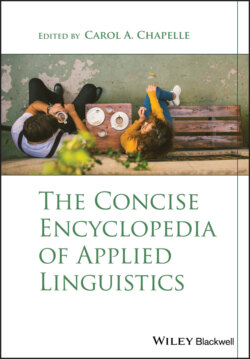Читать книгу The Concise Encyclopedia of Applied Linguistics - Carol A. Chapelle - Страница 153
Introduction
ОглавлениеVocabulary is such an integral component of language use that to some degree any form of language assessment is a measure of vocabulary ability, among other things. However, assessing vocabulary is normally understood to be a process of testing learners' knowledge of a sample of content words, not simply to find out whether they know those particular words but to investigate their ability to understand and use vocabulary in a more general sense.
It is useful to explore a little further what is meant by vocabulary. Most commonly, for assessment purposes, vocabulary is defined in terms of individual words, but the concept of a “word” is itself a slippery one, as is illustrated by the following sets of word forms:
| (1) | shout | SHOUT | shout | shout | |
| (2) | save | saves | saving | saved | |
| (3) | product | products | production | productive | productivity |
| (4) | sea | season | seal | search | seamless |
In set 1 we have different typographic forms of the same word, with the capital letters and the alternative fonts perhaps indicating added emphasis rather than any difference in meaning. Although the word forms in set 2 are a little more distinct, we can see them as representing different grammatical functions of the same word. In the third set, we can recognize that the words have a common stem form (product) and a shared underlying meaning, but the individual items in the list are more like related but separate words (i.e., members of the same family), as compared to the word forms in the first two sets. On the other hand, the items in set 4 are superficially similar in form, in that they all begin with sea–, but they are obviously different words.
From an assessment perspective, there are two points to make here. First, if a vocabulary test item targets a particular word form and test takers answer correctly, can we also credit them with knowledge of related words? For instance, if learners show that they understand product, is it reasonable to assume that they also know production and productive? The other point is that, even at the level of the individual word, we are not dealing purely with vocabulary; sets 2 and 3 above show how the grammatical functioning of words is an essential part of vocabulary knowledge.
Moving beyond individual word forms, we increasingly recognize that vocabulary also consists of fixed combinations of words, variously known as compound nouns (ironing board) phrasal verbs (put up with), collocations (heavy rain), idioms (shoot the breeze), formulaic sequences (I declare the meeting closed), lexical phrases (as a matter of fact), and so on. To the extent that these multiword units are included in vocabulary tests, they are often treated as if they were single words, but such items have received little attention in their own right in language assessment.
